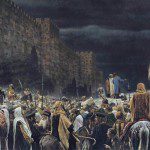My favorite question asked of men and women preparing for ordination in the Presbyterian Church is this: “Will you seek to serve the people with energy, intelligence, imagination, and love?” The question reminds both the person being ordained and those who count on pastors for competent, faithful leadership that each of those qualities matters. It’s not enough to be theologically educated. Or to be committed to church growth or to programs or even to good preaching. The habits of mind and heart the question identifies challenge the person entering leadership to understand service as a matter of ongoing spiritual development, and the vocation of ministry an ongoing process of seeking.
I’ve come to believe that imagination is one of the human qualities most encouraged in Scripture—especially in the Gospels. The parables might well begin with “Imagine this . . . .” Imagine what it feels like to be the man lying by the side of the road who has to accept help from a member of an enemy tribe. Or imagine the distress of a woman who has lost a coin she needs for household expenses. Or of a father whose son has rebelled, wasted his inheritance, and held his father’s hopes in contempt. Imagine the kingdom of heaven not as a political triumph or an equitable economic system but as a mustard seed or a leavened loaf or a wedding banquet. Imagine, if you walk the urban streets in 2016, what it is like to be homeless or chronically hurried or culturally displaced or disoriented and scared.
The biblical story is riddled with gaps that leave room for imagination, reminding us that Scripture is not an instruction book, but a story to be entered as a place of habitation and exploration, a story that provides maps and clues and equipment for our unique journeys. Story after story in Old and New Testaments tease us into imagining: how did Sarah feel when Abraham and Isaac returned from their traumatic, transformative moment on the mountain? What did Joseph say when Mary told him she was with child? What happened to Lazarus after he was raised from the dead? What did Jesus do on his long, sojourns in the desert? How did sudden sight change the blind man’s life? We are left to imagine.
If we enter those gaps and dwell there, imagination will become a habit, and we will begin to see each other and the circumstances of our shared lives with eyes more open to possibilities. The most imaginative people I’ve known don’t pass quick or unthinking judgment. They don’t stereotype. They are more compassionate because they can imagine their way into others’ points of view, constraints, problems, hopes, histories.
It has seemed to me over decades of teaching literature that the main reason to read fiction or poems or plays is to foster compassion. And peacemaking. The wise reminder that “The only peace we can have is the peace we can imagine” challenges us all to put real energy into imagining what peace might look like, as specifically as possible. Out of that inner work comes changed behavior, new strategies, courage to change what we can, the wisdom to focus our efforts effectively. Imaginative living is playful and trusting, engaged and engaging, capable of going to very dark places, and of delight in ordinary things. It’s a good way to live. We’re designed for it. And called to it.











